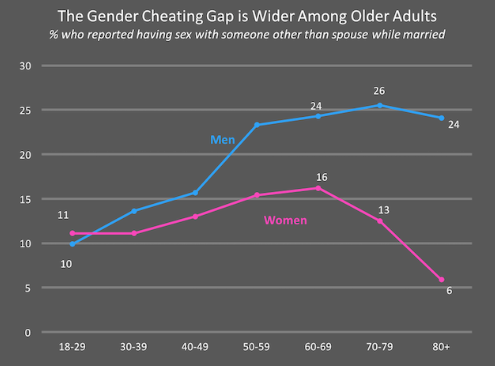Infidelity in relationships is a sensitive but extremely complicated issue that continues to provoke discussion and concern over the years. Various surveys are held to find out who cheats more to their partner, men or women. In this article, we are going to provide the final verdict on this topic based on various research and insights and answer you who cheats more men or women.
Remember, the purpose of the article is not to offend any gender’s sentiments, but to be realistic while offering an accurate assessment based on the findings of our research. Previously, numerous institutes conducted surveys in specific age groups and demographics to determine what was true, but a brief survey cannot disclose the true emotions of millions of couples. This is why we have included the previous trends and opinions of a few individuals who have closely interacted with us.
Understanding the trends can help you to get valuable insights into a relationship. You will also get the various statistics in this article so that you will have access to more reliable data. So, let’s begin with who is more loyal male or female in a relationship.
Who Cheats More Men or Women in a Relationship?
This is a very subjective question who cheats more in a relationship? According to research, women are slightly more likely to cheat than men under the age group of 18 to 29 years. However, in a higher age group (30 to 39 years), men are more likely to cheat than women (14% and 11% respectively). Men in the increasing age group have more potential to cheat with their partners and this number goes up to 26% in general.
Also, unmarried couples and married couples have a different inclination towards cheating and men are more likely to cheat being married. Compared to their female counterparts, men who deceive are more likely to be married. 34% of males who have cheated on their spouse have been separated or divorced, compared to 61% who are still married. However, 47% of women who have cheated are separated or divorced, and only 44% are married at the moment.
However, these numbers are restricted to certain demographic locations as the surveys. So, it cannot be fully declared that women are more oriented to infidelity. Apart from age groups, who cheats more depends on various factors as discussed below (as per the study conducted).
Read more: 100+ Steamy Truth or Dare Questions for Couples in 2024
The Age Factor in Infidelity
Age factor is the biggest variable when we discuss who cheats more men or women. The following are the statistics according to the age group –

- 18–29 Years: Women are slightly more likely to cheat than men (11% vs. 10%)
- 30–34 Years: The gap reverses for
- 60 Years: Women report the highest rate of infidelity (16%)
- 70 Years: Men have the highest rate of infidelity (26%)
- 80+ Years: The gender gap is the largest, with men 18 percentage points more likely to cheat than women
General Trends on Infidelity
Men report higher rates of infidelity than women. A study by the Kinsey Institute found that 23% of men and 19% of women have cheated.
- Marital Status: Among married individuals, 20% of men and 13% of women admitted to infidelity.
- Generational Shifts: Infidelity among women increased by nearly 40% from 1990 to 2010, while men’s rates remained steady at 21%.
- The Role of Technology: Dating apps have facilitated infidelity, with more men using these platforms. As of March 2021, 75.8% of U.S. Tinder users were male.
These statistics highlight that while men traditionally report higher infidelity rates, the gap is narrowing, especially among younger women. Technological advancements and changing societal norms continue to influence these dynamics.
Cultural and Societal Influences
Cultural norms and expectations of society significantly impact infidelity rates whether it is from men’s side or women’s. In general, men often face a less social stigma for cheating compared to women. This contradictory approach may result in the underreporting of infidelity among women. On the other hand, societies with more egalitarian (those who believe in universal equality) beliefs on gender roles frequently show fewer disparities in infidelity rates between men and women.
Also, access to financial independence has encouraged women to let go an unsatisfying relationships that were earlier dependent on men. This potentially increases their likelihood of seeing fulfillment outside their primary partnership.
As societal norms are evolving, it is crucial to consistently analyze the statistics as per the cultural and societal context for better relationships with your partner for the longer term.
Also read: 46 Best Cheap Date Ideas for Couples on a Low Budget
Cheating in Different Types of Relationships
According to a 2023 study, individuals in long-distance relationships are 30% more susceptible to cheat than those who are living close to their partners. This is generally due to a lack of emotional and physical connection, which causes them to feel lonely or separated.
A survey by Statista showed that 43% of people in long-distance relationships feel distant from their partners, and another study found that 38% of long-distance partners cheat because they feel emotionally neglected. These numbers show how distance can make it harder to stay faithful in a relationship.
Conclusion
The question of who cheats more men or women doesn’t have a straightforward answer, as various factors like cultural, societal, and personal influences play a role. Studies show differing patterns in behavior, with men often cited for more physical infidelity and women for emotional cheating. In the end, infidelity is an intricate issue that spans gender boundaries, and when discussing this subject, it’s important to take into account unique situations and marital dynamics.




